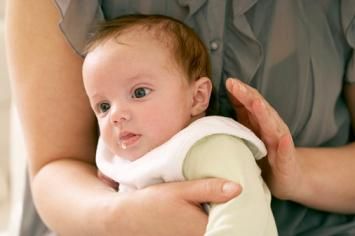A newborn baby may look cute when he gets a few hiccups, but some mothers get worried when they get more hiccups frequently. Why do babies get hiccups? The reasons vary, including swallowed air, temperature changes and under-development. Hiccups don’t bother babies, especially when they are still inside the womb. But if your baby keeps hiccuping for too long, consult a doctor.

Why Do Babies Get Hiccups?
1. Strengthening Diaphragm Muscles
It is not unusual for babies to get hiccups even when they are still in the uterus. Some believe that the hiccups may help the developing fetus to strengthen the diaphragm muscle in preparation for breathing after birth. Many expectant moms feel their baby hiccuping in their second trimester.
2. GER (Gastroesophogeal Refulx)
Gastroesophogeal Reflux (GER) can make babies hiccup due to an underdeveloped sphincter in their esophagus. This sphincter is a muscle found at the bottom of their esophagus, which opens and closes after food enters the stomach and prevents backflow. It may not be fully developed in premature babies and young infants so food moves back up into the esophagus, causing hiccups. Fortunately, most babies outgrow this problem.
3. Swallowed Air
Swallowed air is a common answer to the question “why do babies get hiccups”. Many babies get hiccups after eatingor a bout of crying. This may be due to the air that babies have swallowed. Breastfeeding helps reduce hiccups because it allows baby to swallow less air than when feeding from a bottle.
4. Overfeeding
A full stomach from overfeeding can make your baby get frequent hiccups. It causes them to get stomach spasms, leading to hiccups.
5. Mum’s Diet
Certain types of food you eat while breastfeeding can cause frequent baby hiccups. These include peanuts, eggs, citrus fruits, wheat, caffeine, chocolate and soy products.
6. Temperature Changes
Babies are prone to suffer from temperature changes because of their inability to regulate or maintain body temperatures. A sudden change in temperature may cause your baby's body to react with hiccups.
Is It Normal for Babies to Hiccup?
Hiccups are normal and common in babies under one year old. The hiccups are mostly due to their underdeveloped muscular sphincter which will eventually mature or due to overfeeding which you can try to avoid. As long as your baby is otherwise healthy, you don’t need to worry about it.
When to Worry About Babies’ Hiccups
There is usually no reason to get worried over occasional baby hiccups, unless they disrupt daily activities like eating or sleeping. If you are worried that your baby hiccups too often, ask the doctor, especially if he vomits a lot, coughs out milk frequently or is after the age of one.
How to Relieve Babies’ Hiccups
Since the question “why do babies get hiccups” has been answered, it’s time to learn some measures to relieve the hiccups.
1. Pause Feeding
If your baby has persistent hiccups while nursing/bottle-feeding, stop and resume feeding when the hiccups stop. Calm your baby by patting or rubbing her back because crying babies usually gulp air, causing hiccups. Keep your baby in semi-upright during and after feedings to relieve pressure on her diaphragm. Burp her while you wait to release some of the gas in her stomach. Place her upright on your chest so that her head is above your shoulder. Gently pat or rub her back to let the gas bubbles move out. Resume feeding after burping.
2. Reduce Air Swallowing
Listen for gulping noises while your baby feeds. Check if your baby latches on correctly while breastfeeding. Her lips should cover your areola and not just your nipple. Tilt the baby bottle 45 degrees while bottle-feeding to make sure no air comes out of the nipple. You can also use a collapsible bag insert for the bottle. Check the nipple hole in the bottle. If it is too big, formula will flow too rapidly. If it is too small, your baby will gulp more air. A hole with the proper size allows only a few drops to come out when the bottle is tipped.
3. Adjust Feeding Schedule
Doctors advise short, but frequent feedings. Pause feeding and burp often especially when switching breasts. Burp the baby after eating 2 - 3 ounces (or 60 to 90 ml) of formula. Newborn infants need more frequent burping. They usually feed 8 to12 times in a day. Feed your baby when they seem hungry. Learn to read signs of hunger such as crying, feeding mouth movements or restlessness.
4. Seek Medical Help
Most hiccups naturally go away but if you're still not sure why do babies get hiccups, consult a doctor if you feel that your child is not feeding normally or if it is affecting their normal activities and growth. Talk to your pediatrician if the baby’s hiccuping lasts for more than twenty minutes. Your doctor may prescribe medicine or give recommendations on how to help your baby. Consult a pediatrician immediately if the hiccups interfere with the baby's breathing or if you hear wheezing or obstructed breathing.
Note
It is not advisable to startle your baby, press on the eyeballs, push on the fontanel or pull her tongue to stop hiccups. These common folk remedies could hurt your baby and do not actually work.
Pay attention to frequent hiccups by writing down the frequency and duration of each episode. Observe if there is a common pattern to help you figure out how to relieve them.
